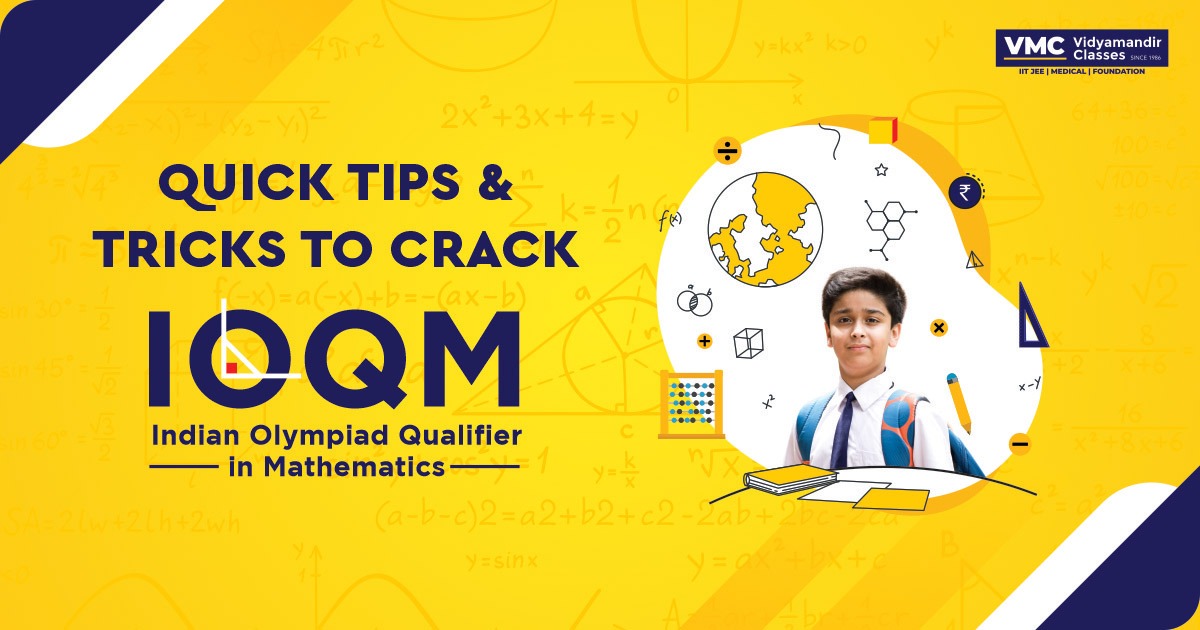Tips & Tricks to Crack the Indian Olympiad Qualifier in Mathematics
 Posted On
Posted On
3,901 total views, 1 views today
Indian Olympiad Qualifier in Mathematics (IOQM) is a competitive level examination, which allows the brightest young minds of the world to pursue their goals and provides them with the opportunity to represent their nation. This examination is conducted in collaboration with the Indian Association of Physics Teachers (IAPT), Mathematics Teachers Association of India (MTAI), and Homi Bhabha Centre for Science Education (HBCSE).
It is a single qualifying test & a 3 hour paper, divided into two sections i.e., PRMO & RMO. The fact is that all the students studying in Class VIII, IX, X, XI or XII, are eligible for IOQM (PRMO & RMO) exams. The student must qualify in PRMO in order to advance to the next round or the RMO exam.
Different stages of selection for the 2022-2023 cycle
· First stage exam: –
The first stage of the exam is the Indian Olympiad Qualifier in Mathematics. The exam is going to be held on October 30, 2022. It is of 3 hour duration and total marks will be 100. The answer to each question is an integer in the range 00-99. There is no negative marking and the exam is also OMR-based. The exam paper consists of 10 questions of 2 marks each, 12 questions of 5 marks each and 2 questions of 10 marks each.
· Second stage exam:–
The second stage of the exam is the Indian National Mathematical Olympiad. The exam is going to be held on January 15, 2023. The exam duration is 4 hours. There would be six numbers of questions and each question would require writing detailed proof.
Selection and the Eligibility Criteria
You can check the eligibility criteria for IOQM and the selection criteria for INMO from IOQM from this website link. The selection criteria for IMOTC from INMO will be published later on.
Enrolment for IOQM 2022-23
Students are hereby requested to visit https://emsecure.in/MTAEXAM to register and enroll for IOQM. The enrollment fee is RS 200.
Quick Tips & Tricks to crack the exams are as follows
1. Focus on your Mathematical Aptitude
Candidates need to cultivate their analytical & mathematical aptitude and try to sharpen their logical skillset.
2. Study NCERT textbooks
Concentrate and devote your time to study NCERT textbooks as it helps brush up your fundamentals. Browse through all the NCERT textbook questions and answers. Revise the topics thoroughly & make your own proofs.
3. Browse through a variety of resources & other study materials
Keep on studying a variety of resources & other study materials as it helps you excel in the competitive examination. Try to solve a large number of questions from different reference books and try to analyze the difficulty level of the IOQM. If you get through the advanced level books, then it helps sharpen your analytical & thinking skills.
4. Get previous year Sample Papers
If you want to get good grades in the Olympiad examination, you need to solve previous year sample papers. This way, you could easily figure out your strengths & flaws and easily work on improving them.
5. Practice Mathematical Calculations
Keep some of your time to practice mathematical problems and tighten your grip on number- related problems in permutation and combination.
Opportunities & Challenges behind the Olympiad Examination
The primary challenge behind this type of examination is to identify the student’s area of expertise and develop the right knowledge about the subject. HBCSE IOQM is more challenging as compared to other regular subjects, however, this exam helps students to improve their academic performance.
Students who participate in IOQM will get a wide range of opportunities and it also unlocks the door to a bright future ahead including an added advantage of admissions, jobs and interviews.
Final Words –
The IOQM syllabus is not that tough for students who prepare at an early stage i.e. between classes 8 to 10. Once the students reach class 11, they are already familiar with the topics concerned and already through with most of the math syllabus. Additionally, they would benefit a lot in terms of IIT JEE preparations as well.



